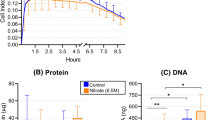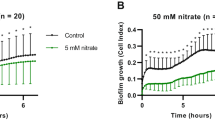Abstract
Despite recent interest in functional food merits of dietary nitrate, there is a paucity of information on its utility as a pre-biotic for the enrichment of health-promoting oral bacteria. The objective of this investigation was to observe the dynamic change in the denitrifying oral microbiome of healthy human volunteers following supplementation of nitrate enriched diet for a period of two-weeks. The study involved isolation, identification and comparison of nitrate-reducing oral bacteria of five human volunteers before and after supplementation of a nitrate-rich diet. This was further correlated with salivary nitrite contents to understand denitrification efficacy with prolonged dietary nitrate supplementation. A total of 153 bacterial strains were isolated from baseline (BSL) samples of healthy participants, i.e. before supplementation and after dietary nitrate supplementation (ADNS); 32 out of these isolates could be confirmed to be nitrate-reducers. Although members of Firmicutes viz., Streptococcus salivarius, Streptococcus parasanguinis and Actinobacteria viz., Rothia mucilaginosa were present in both BSL and ADNS samples, the relative abundance of Actinobacteria was higher and Firmicutes was lower in ADNS in comparison to BSL samples. Moreover, Proteobacteria were found only in ADNS and not BSL samples. Interestingly, these changes in nitrate-reducing microbiome were correlated with higher salivary nitrite levels on day 14 in comparison to day 1 following acute supplementation of dietary NO3−. Thus, it is being hypothesized that Rothia, Neisseria and Streptococcus spp. which appeared following 14 days of nitrate supplementation, could be more efficient towards reducing nitrate and boosting salivary nitrite levels.







Similar content being viewed by others
Code Availability
Not applicable.
Abbreviations
- ADNS:
-
After dietary nitrate supplementation
- ANA:
-
Anaerobic Agar
- BSL:
-
Baseline
- MRS:
-
De Man Rogosa and Sharpe agar
- NA:
-
Nutrient agar
- NO:
-
Nitric oxide
- NO2 – :
-
Nitrite
- NO3 – :
-
Nitrate
- PCR:
-
Polymerase chain reaction
- RCA:
-
Reinforced clostridial agar
- rRNA:
-
Ribosomal ribonucleic acid
- TSA:
-
Tryptic soy agar
References
Bahadoran Z, Ghasemi A, Mirmiran P, Azizi F, Hadaegh F (2015) Beneficial effects of inorganic nitrate/nitrite in type 2 diabetes and its complications. Nutr Metabolism 12:16. https://doi.org/10.1186/s12986-015-0013-6
Bauer MA, Kainz K, Carmona-Gutierrez D, Madeo F (2018) Microbial wars: competition in ecological niches and within the microbiome. Microb Cell 5:215–219. https://doi.org/10.15698/mic2018.05.628
Bhusal A, Muriana PM (2021) Isolation and characterization of nitrate reducing bacteria for conversion of vegetable-derived nitrate to ‘Natural nitrite’. Appl Microbiol 1:11–23. https://doi.org/10.3390/applmicrobiol1010002
Bondonno CP et al (2015) Antibacterial mouthwash blunts oral nitrate reduction and increases blood pressure in treated hypertensive men and women. Am J Hypertens 28:572–575. https://doi.org/10.1093/ajh/hpu192
Bondonno CP, Croft KD, Hodgson JM (2016) Dietary nitrate, nitric oxide, and cardiovascular health. Crit Rev Food Sci Nutr 56:2036–2052. https://doi.org/10.1080/10408398.2013.811212
Briskey D, Tucker PS, Johnson DW, Coombes JS (2016) Microbiota and the nitrogen cycle: implications in the development and progression of CVD and CKD. Nitric Oxide 57:64–70. https://doi.org/10.1016/j.niox.2016.05.002
Bryan NS (2009) Cardioprotective actions of nitrite therapy and dietary considerations. Front Bioscience (Landmark Ed) 14:4793–4808. https://doi.org/10.2741/3568
Burleigh MC et al (2018) Salivary nitrite production is elevated in individuals with a higher abundance of oral nitrate-reducing bacteria. Free Radic Biol Med 120:80–88. https://doi.org/10.1016/j.freeradbiomed.2018.03.023
Burleigh M et al (2019) Dietary nitrate supplementation alters the oral microbiome but does not improve the vascular responses to an acute nitrate dose. Nitric Oxide 89:54–63. https://doi.org/10.1016/j.niox.2019.04.010
Clarke KR, Warwick RM (2001) Change in marine communities: an approach to statistical analysis and interpretation. Primer-E Ltd, Plymouth, UK. In
Clements WT, Lee SR, Bloomer RJ (2014) Nitrate ingestion: a review of the health and physical performance effects. Nutrients 6:5224–5264. https://doi.org/10.3390/nu6115224
Deo PN, Deshmukh R (2019) Oral microbiome: unveiling the fundamentals. J oral Maxillofacial Pathology: JOMFP 23:122–128. https://doi.org/10.4103/jomfp.JOMFP_304_18
Doel JJ, Benjamin N, Hector MP, Rogers M, Allaker RP (2005) Evaluation of bacterial nitrate reduction in the human oral cavity. Eur J Oral Sci 113:14–19. https://doi.org/10.1111/j.1600-0722.2004.00184.x
Dos Santos Baião D, Vieira Teixeira da Silva D, Margaret Flosi Paschoalin V (2021) A narrative review on dietary strategies to provide nitric oxide as a non-drug cardiovascular disease therapy: Beetroot Formulations-A Smart Nutritional intervention. Foods (Basel Switzerland) 10:859. https://doi.org/10.3390/foods10040859
Farah C, Michel LYM, Balligand JL (2018) Nitric oxide signaling in cardiovascular health and disease. Nat Reviews Cardiol 15:292–316. https://doi.org/10.1038/nrcardio.2017.224
Freedman D, Pisani R, Purves R (2007) Statistics (international student edition) Pisani, R. Purves, 4th Edn. WW Norton & Company, New York
Govoni M, Jansson EÅ, Weitzberg E, Lundberg JO (2008) The increase in plasma nitrite after a dietary nitrate load is markedly attenuated by an antibacterial mouthwash. Nitric Oxide 19:333–337. https://doi.org/10.1016/j.niox.2008.08.003
Hezel MP, Weitzberg E (2015) The oral microbiome and nitric oxide homoeostasis. Oral Dis 21:7–16. https://doi.org/10.1111/odi.12157
Hohensinn B et al (2016) Sustaining elevated levels of Nitrite in the oral cavity through consumption of nitrate-rich beetroot juice in young healthy adults reduces salivary pH. Nitric Oxide 60:10–15. https://doi.org/10.1016/j.niox.2016.08.006
Hyde ER et al (2014a) Metagenomic analysis of nitrate-reducing bacteria in the oral cavity: implications for nitric oxide homeostasis. PLoS ONE 9:e88645. https://doi.org/10.1371/journal.pone.0088645
Hyde ER et al (2014b) Characterization of the rat oral microbiome and the effects of dietary nitrate. Free Radic Biol Med 77:249–257. https://doi.org/10.1016/j.freeradbiomed.2014.09.017
Jockel-Schneider Y et al (2016) Stimulation of the nitrate-nitrite-NO-metabolism by repeated lettuce juice consumption decreases gingival inflammation in periodontal recall patients: a randomized, double-blinded, placebo-controlled clinical trial. J Clin Periodontol 43:603–608. https://doi.org/10.1111/jcpe.12542
Kapil V, Haydar SM, Pearl V, Lundberg JO, Weitzberg E, Ahluwalia A (2013) Physiological role for nitrate-reducing oral bacteria in blood pressure control. Free Radic Biol Med 55:93–100. https://doi.org/10.1016/j.freeradbiomed.2012.11.013
Kobayashi J, Ohtake K, Uchida H (2015) NO-rich diet for lifestyle-related diseases. Nutrients 7:4911–4937. https://doi.org/10.3390/nu7064911
Li H et al (1997) Nitrate-reducing bacteria on rat tongues. Appl Environ Microbiol 63:924–930. https://doi.org/10.1128/aem.63.3.924-930.1997
Lidder S, Webb AJ (2013) Vascular effects of dietary nitrate (as found in green leafy vegetables and beetroot) via the nitrate-nitrite-nitric oxide pathway. Br J Clin Pharmacol 75:677–696. https://doi.org/10.1111/j.1365-2125.2012.04420.x
Löytynoja A, Goldman N (2010) webPRANK: a phylogeny-aware multiple sequence aligner with interactive alignment browser. BMC Bioinformatics 11:579. https://doi.org/10.1186/1471-2105-11-579
Lundberg JO, Weitzberg E, Cole JA, Benjamin N (2004) Nitrate, bacteria and human health. Nat Rev Microbiol 2:593–602. https://doi.org/10.1038/nrmicro929
Lundberg JO, Weitzberg E, Gladwin MT (2008) The nitrate-nitrite-nitric oxide pathway in physiology and therapeutics. Nat Rev Drug Discovery 7:156–167. https://doi.org/10.1038/nrd2466
Lundberg JO, Carlström M, Weitzberg E (2018) Metabolic effects of Dietary Nitrate in. Health Disease 28:9–22. https://doi.org/10.1016/j.cmet.2018.06.007
MacFaddin JF (2000) In: Baltimore (ed) Biochemical tests for identification of medical bacteria, 3rd edn. Williams and Wilkins, Md.)
Mazidi M, Rezaie P, Kengne AP, Mobarhan MG, Ferns GA (2016) Gut microbiome and metabolic syndrome. Diabetes Metabolic Syndrome: Clin Res Reviews 10:S150–157. https://doi.org/10.1016/j.dsx.2016.01.024
McWilliam H et al (2013) Analysis tool web services from the EMBL-EBI. Nucleic Acids Res 41:W597–600. https://doi.org/10.1093/nar/gkt376
Miller CS, Handley KM, Wrighton KC, Frischkorn KR, Thomas BC, Banfield JF (2013) Short-read assembly of full-length 16S amplicons reveals bacterial diversity in subsurface sediments. PLoS ONE 8:e56018. https://doi.org/10.1371/journal.pone.0056018
Paster BJ et al (2001) Bacterial diversity in human subgingival plaque. J Bacteriol 183:3770–3783. https://doi.org/10.1128/JB.183.12.3770-3783.2001
Rosier BT, Marsh PD, Mira A (2018) Resilience of the oral microbiota in health: mechanisms that prevent dysbiosis. J Dent Res 97:371–380. https://doi.org/10.1177/0022034517742139
Rosier BT, Buetas E, Moya-Gonzalvez EM, Artacho A, Mira A (2020) Nitrate as a potential prebiotic for the oral microbiome. Sci Rep 10:12895. https://doi.org/10.1038/s41598-020-69931-x
Shannon OM, Easton C, Shepherd AI, Siervo M, Bailey SJ, Clifford T (2021) Dietary nitrate and population health: a narrative review of the translational potential of existing laboratory studies. BMC Sports Sci Med Rehabilitation 13:65. https://doi.org/10.1186/s13102-021-00292-2
Sobko T, Reinders C, Norin E, Midtvedt T, Gustafsson LE, Lundberg JO (2004) Gastrointestinal nitric oxide generation in germ-free and conventional rats. Am J Physiology-Gastrointestinal Liver Physiol 287:G993–997. https://doi.org/10.1152/ajpgi.00203.2004
van Maanen JM, van Geel AA, Kleinjans JC (1996) Modulation of nitrate-nitrite conversion in the oral cavity. Cancer Detect Prev 20:590–596
Vanhatalo A et al (2018) Nitrate-responsive oral microbiome modulates nitric oxide homeostasis and blood pressure in humans. Free Radic Biol Med 124:21–30. https://doi.org/10.1016/j.freeradbiomed.2018.05.078
Velmurugan S et al (2016) Dietary nitrate improves vascular function in patients with hypercholesterolemia: a randomized, double-blind, placebo-controlled study. Am J Clin Nutr 103:25–38. https://doi.org/10.3945/ajcn.115.116244
Vidanapathirana AK, Psaltis PJ, Bursill CA, Abell AD, Nicholls SJ (2021) Cardiovascular bioimaging of nitric oxide: achievements, challenges, and the future. Med Res Rev 41:435–463. https://doi.org/10.1002/med.21736
Weitzberg E, Lundberg JO (2013) Novel aspects of dietary nitrate and human health. Annu Rev Nutr 33:129–159. https://doi.org/10.1146/annurev-nutr-071812-161159
Wightman EL et al (2015) Dietary nitrate modulates cerebral blood flow parameters and cognitive performance in humans: a double-blind, placebo-controlled, crossover investigation. Physiol Behav 149:149–158. https://doi.org/10.1016/j.physbeh.2015.05.035
Woessner M, Smoliga JM, Tarzia B, Stabler T, Van Bruggen M, Allen JD (2016) A stepwise reduction in plasma and salivary nitrite with increasing strengths of mouthwash following a dietary nitrate load. Nitric Oxide 54:1–7. https://doi.org/10.1016/j.niox.2016.01.002
**yuan Z, Fink RHA, Mosqueira M (2017) NO-sGC pathway modulates Ca2+ release and muscle contraction in zebrafish skeletal muscle. Front Physiol 8:607. https://doi.org/10.3389/fphys.2017.00607
Acknowledgements
We express our sincere gratitude to the “University Institute of Engineering and Technology (UIET), Panjab University (PU), Chandigarh” and “CSIR-Institute of Microbial Technology (CSIR-IMTECH), Chandigarh” for their invaluable assistance and exceptional laboratory analysis.
Funding
This work was supported by “Defence Institute of High Altitude Research (DIHAR), Defence Research and Development Organization (DRDO), Ministry of Defence, Govt. of India, C/O 56 APO, Leh-Ladakh, Pin-194101, India”.
Author information
Authors and Affiliations
Contributions
Nitish Kumar contributed to the design of the research, collected samples, conducted lab work and conducted the analysis. Madhu Khatri and Shweta Saxena conceived the idea of this research work and as a supervisor contributed to the conceptualization and implementation of the research. Ragumani Sugadev contributed to the statistical analysis and data interpretation of the study. The experiments were conducted with help from Manoj Kumar Patel, Shardulya Shukla, and Bhupinder Kaur. All authors have read and approved the final version of the manuscript.
Corresponding author
Ethics declarations
Ethical approval
This study was approved by “Institutional Ethics Committee of Panjab University (PUIEC, Chandigarh)”, (approval no: PUIEC210312-II-044).
Conflict of interest
Not applicable.
Additional information
Publisher’s Note
Springer Nature remains neutral with regard to jurisdictional claims in published maps and institutional affiliations.
Electronic supplementary material
Below is the link to the electronic supplementary material.
Rights and permissions
Springer Nature or its licensor (e.g. a society or other partner) holds exclusive rights to this article under a publishing agreement with the author(s) or other rightsholder(s); author self-archiving of the accepted manuscript version of this article is solely governed by the terms of such publishing agreement and applicable law.
About this article
Cite this article
Kumar, N., Kaur, B., Shukla, S. et al. Dietary nitrate supplementation influences the oral denitrifying microbiome in human volunteers: a pilot study. Biologia 79, 2165–2177 (2024). https://doi.org/10.1007/s11756-024-01681-x
Received:
Accepted:
Published:
Issue Date:
DOI: https://doi.org/10.1007/s11756-024-01681-x




